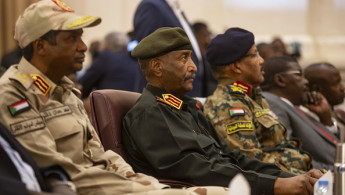Sudan's warring parties continue talks with UN envoy
Talks between a UN envoy and delegations from both warring parties in Sudan are continuing in Geneva this week, focused on humanitarian aid and protecting civilians, the United Nations said Tuesday.
War has raged since April 2023 between the Sudanese regular army under Abdel Fattah al-Burhan and the paramilitary Rapid Support Forces, led by his former deputy Mohamed Hamdan Daglo.
UN Secretary-General Antonio Guterres's personal envoy for Sudan, Ramtane Lamamra, invited delegations from the army and the RSF for talks which began on Thursday.
The discussions are taking place under the so-called proximity format, whereby Lamamra is meeting separately with each delegation at a time, in different rooms. The two delegations are not scheduled to meet each other.
Lamamra and his team had several interactions with both delegations throughout the weekend, UN spokeswoman Alessandra Vellucci told a media briefing.
"The teams engaged intensively on the two key items discussed during these talks: humanitarian assistance and protection of civilians," she said.
"The discussions are continuing this week."
No end date has been scheduled.
The two delegations are comprised of senior representatives of the warring parties and include humanitarian, security and military experts.
The talks are in Geneva, with some taking place at the UN's Palais des Nations headquarters.
Despite being present in the Swiss city, one side did not show up for Thursday's first day of discussions, though the UN did not say which party. However, both parties are now engaging with Lamamra, the former Algerian foreign minister.
"With each delegation he has engaged during the weekend, several times," said Vellucci.
'Promising signs'
The conflict in Sudan has left tens of thousands dead and displaced more than 10 million people, according to the United Nations.
A recent UN-backed report said nearly 26 million people, or slightly more than half of the population, were facing high levels of "acute food insecurity".
Shible Sahbani, the World Health Organization's representative in Sudan said there were "a few promising signs" emerging from Monday's talks in Geneva.
"Let's wait for the coming hours and days, and we hope that... if we don't get a ceasefire, at least we can get the protection of civilians and the opening of humanitarian corridors," he said, speaking from Port Sudan.
He said the protection of civilians should also incorporate respect for international humanitarian law, including opening access to basic services and the protection of health care.
Sahbani visited the border between Sudan and Chad last week and said many refugees explained the main reason they were fleeing was now hunger.
"It's not insecurity, it's not lack of access to basic services but because they have nothing to eat," he said, with people reporting that whatever food was produced locally was being taken by fighters.
He called the situation an "unfolding humanitarian catastrophe".
"If we don't take action now, the rapidly deteriorating situation in Sudan could spiral out of hand, permitting the unchecked reign of diseases, malnutrition and trauma with transgenerational impact on Sudan's people," said Sahbani.




 Follow the Middle East's top stories in English at The New Arab on Google News
Follow the Middle East's top stories in English at The New Arab on Google News

![A group of Palestinians, foreign and Israeli activists gather to participated in an olive picking event on the land in the town of Battir, which is under threat of confiscation by Israel in Bethlehem, occupied West Bank on 8 November 2024. [Getty]](/sites/default/files/styles/image_330x185/public/2182930803.jpeg?h=199d8c1f&itok=__0LgGsa)
